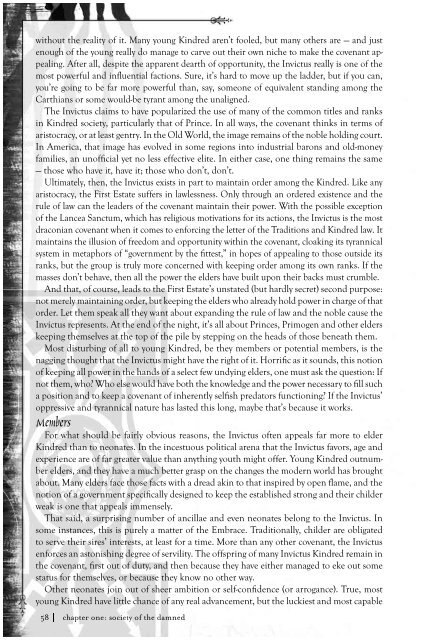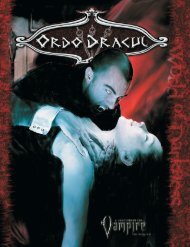Mind's Eye Theatre - Vampire The Requiem.pdf - RoseRed
Mind's Eye Theatre - Vampire The Requiem.pdf - RoseRed
Mind's Eye Theatre - Vampire The Requiem.pdf - RoseRed
Create successful ePaper yourself
Turn your PDF publications into a flip-book with our unique Google optimized e-Paper software.
without the reality of it. Many young Kindred aren’t fooled, but many others are — and just<br />
enough of the young really do manage to carve out their own niche to make the covenant appealing.<br />
After all, despite the apparent dearth of opportunity, the Invictus really is one of the<br />
most powerful and infl uential factions. Sure, it’s hard to move up the ladder, but if you can,<br />
you’re going to be far more powerful than, say, someone of equivalent standing among the<br />
Carthians or some would-be tyrant among the unaligned.<br />
<strong>The</strong> Invictus claims to have popularized the use of many of the common titles and ranks<br />
in Kindred society, particularly that of Prince. In all ways, the covenant thinks in terms of<br />
aristocracy, or at least gentry. In the Old World, the image remains of the noble holding court.<br />
In America, that image has evolved in some regions into industrial barons and old-money<br />
families, an unoffi cial yet no less effective elite. In either case, one thing remains the same<br />
— those who have it, have it; those who don’t, don’t.<br />
Ultimately, then, the Invictus exists in part to maintain order among the Kindred. Like any<br />
aristocracy, the First Estate suffers in lawlessness. Only through an ordered existence and the<br />
rule of law can the leaders of the covenant maintain their power. With the possible exception<br />
of the Lancea Sanctum, which has religious motivations for its actions, the Invictus is the most<br />
draconian covenant when it comes to enforcing the letter of the Traditions and Kindred law. It<br />
maintains the illusion of freedom and opportunity within the covenant, cloaking its tyrannical<br />
system in metaphors of “government by the fi ttest,” in hopes of appealing to those outside its<br />
ranks, but the group is truly more concerned with keeping order among its own ranks. If the<br />
masses don’t behave, then all the power the elders have built upon their backs must crumble.<br />
And that, of course, leads to the First Estate’s unstated (but hardly secret) second purpose:<br />
not merely maintaining order, but keeping the elders who already hold power in charge of that<br />
order. Let them speak all they want about expanding the rule of law and the noble cause the<br />
Invictus represents. At the end of the night, it’s all about Princes, Primogen and other elders<br />
keeping themselves at the top of the pile by stepping on the heads of those beneath them.<br />
Most disturbing of all to young Kindred, be they members or potential members, is the<br />
nagging thought that the Invictus might have the right of it. Horrifi c as it sounds, this notion<br />
of keeping all power in the hands of a select few undying elders, one must ask the question: If<br />
not them, who? Who else would have both the knowledge and the power necessary to fi ll such<br />
a position and to keep a covenant of inherently selfi sh predators functioning? If the Invictus’<br />
oppressive and tyrannical nature has lasted this long, maybe that’s because it works.<br />
Members<br />
For what should be fairly obvious reasons, the Invictus often appeals far more to elder<br />
Kindred than to neonates. In the incestuous political arena that the Invictus favors, age and<br />
experience are of far greater value than anything youth might offer. Young Kindred outnumber<br />
elders, and they have a much better grasp on the changes the modern world has brought<br />
about. Many elders face those facts with a dread akin to that inspired by open fl ame, and the<br />
notion of a government specifi cally designed to keep the established strong and their childer<br />
weak is one that appeals immensely.<br />
That said, a surprising number of ancillae and even neonates belong to the Invictus. In<br />
some instances, this is purely a matter of the Embrace. Traditionally, childer are obligated<br />
to serve their sires’ interests, at least for a time. More than any other covenant, the Invictus<br />
enforces an astonishing degree of servility. <strong>The</strong> offspring of many Invictus Kindred remain in<br />
the covenant, fi rst out of duty, and then because they have either managed to eke out some<br />
status for themselves, or because they know no other way.<br />
Other neonates join out of sheer ambition or self-confi dence (or arrogance). True, most<br />
young Kindred have little chance of any real advancement, but the luckiest and most capable<br />
58<br />
chapter one: society of the damned



